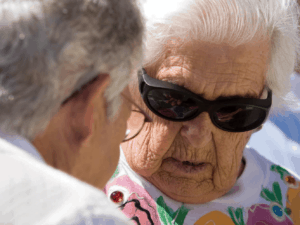Alzheimer’s disease is an illness of the brain. It causes large numbers of nerve cells in the brain to die. This affects a person’s ability to remember things and think clearly. People with Alzheimer’s disease become forgetful and easily confused. They may have a hard time concentrating and behave in odd ways. These problems get worse as the illness gets worse, making your job as caregiver harder.
It’s important to remember that the disease, not the person with Alzheimer’s disease, causes these changes. Also, each person with Alzheimer’s disease may not have all the problems we talk about in this book.
The following sections describe the three main challenges that you may face as you care for someone with Alzheimer’s disease:
- Changes in communication skills
- Changes in personality and behavior
- Changes in intimacy and sexuality
Each section includes information on how to cope with these challenges.
2. Challenge: Changes in Personality and Behavior
Because Alzheimer’s disease causes brain cells to die, the brain works less well over time. This changes how a person acts. You will notice that he or she will have good days and bad days.
Here are some common personality changes you may see:
- Getting upset, worried, and angry more easily
- Acting depressed or not interested in things
- Hiding things or believing other people are hiding things
- Imagining things that aren’t there
- Wandering away from home
- Pacing a lot of the time
- Showing unusual sexual behavior
- Hitting you or other people
- Misunderstanding what he or she sees or hears
Also, you may notice that the person stops caring about how he or she looks, stops bathing, and wants to wear the same clothes every day.

Other factors that may affect how people with Alzheimer’s disease behave
In addition to changes in the brain, the following things may affect how people with Alzheimer’s disease behave.
How they feel:
- Sadness, fear, or a feeling of being overwhelmed
- Stress caused by something or someone
- Confusion after a change in routine, including travel
- Anxiety about going to a certain place
Health-related problems:
- Illness or pain
- New medications
- Lack of sleep
- Infections, constipation, hunger, or thirst
- Poor eyesight or hearing
- Alcohol abuse
- Too much caffeine
Problems in their surroundings:
- Being in a place he or she doesn’t know well.
- Too much noise, such as TV, radio, or many people talking at once. Noise can cause confusion or frustration.
- Stepping from one type of flooring to another. The change in texture or the way the floor looks may make the person think he or she needs to take a step down.
- Misunderstanding signs. Some signs may cause confusion. For example, one person with Alzheimer’s disease thought a sign reading “Wet Floor” meant he should urinate on the floor.
- Mirrors. Someone with Alzheimer’s disease may think that a mirror image is another person in the room.
How to Cope with Personality and Behavior Changes
Here are some ways to cope with changes in personality and behavior:
- Keep things simple. Ask or say one thing at a time.
- Have a daily routine, so the person knows when certain things will happen.
- Reassure the person that he or she is safe and you are there to help.
- Focus on his or her feelings rather than words. For example, say, “You seem worried.”
- Don’t argue or try to reason with the person.
- Try not to show your anger or frustration. Step back. Take deep breaths, and count to 10. If safe, leave the room for a few minutes.
- Use humor when you can.
- Give people who pace a lot a safe place to walk. Provide comfortable, sturdy shoes. Give them light snacks to eat as they walk, so they don’t lose too much weight, and make sure they have enough to drink.
Use distractions:
- Try using music, singing, or dancing to distract the person. One caregiver found that giving her husband chewing gum stopped his cursing.
- Ask for help. For instance, say, “Let’s set the table” or “I really need help folding the clothes.”
Other ideas:
- Enroll the person in the MedicAlert®+Alzheimer’s Association Safe Return® Program. If people with Alzheimer’s disease wander away from home, this program can help get them home safely (www.alz.org or 1-888-572-8566).
- Talk to the doctor about any serious behavior or emotional problems, such as hitting, biting, depression, or hallucinations.
How to Cope with Sleep Problems
Evenings are hard for many people with Alzheimer’s disease. Some may become restless or irritable around dinnertime. This restlessness is called “sundowning.” It may even be hard to get the person to go to bed and stay there.
Here are some tips that may help:
- Help the person get exercise each day, limit naps, and make sure the person gets enough rest at night. Being overly tired can increase late-afternoon and nighttime restlessness.
- Plan activities that use more energy early in the day. For example, try bathing in the morning or having the largest family meal in the middle of the day.
- Set a quiet, peaceful mood in the evening to help the person relax. Keep the lights low, try to reduce the noise levels, and play soothing music if he or she enjoys it.
- Try to have the person go to bed at the same time each night. A bedtime routine, such as reading out loud, also may help.
- Limit caffeine.
- Use nightlights in the bedroom, hall, and bathroom.

How to Cope with Hallucinations and Delusions
As the disease progresses, the person with Alzheimer’s disease may have hallucinations. During a hallucination, a person sees, hears, smells, tastes, or feels something that isn’t there. For example, the person may see his or her dead mother in the room. He or she also may have delusions. Delusions are false beliefs that the person thinks are real. For example, the person may think his or her spouse is in love with someone else.
Here are some things you can do:
- Tell the doctor or Alzheimer’s disease specialist about the delusions or hallucinations.
- Discuss with the doctor any illnesses the person has and medicines he or she is taking. Sometimes an illness or medicine may cause hallucinations or delusions.
- Try not to argue about what the person with Alzheimer’s disease sees or hears. Comfort the person if he or she is afraid.
- Distract the person. Sometimes moving to another room or going outside for a walk helps.
- Turn off the TV when violent or upsetting programs are on. Someone with Alzheimer’s disease may think these events are really going on in the room.
- Make sure the person is safe and can’t reach anything that could be used to hurt anyone or himself or herself.

How to Cope with Paranoia
Paranoia is a type of delusion in which a person may believe— without a good reason—that others are mean, lying, unfair, or “out to get him or her.” He or she may become suspicious, fearful, or jealous of people.
In a person with Alzheimer’s disease, paranoia often is linked to memory loss. It can become worse as memory loss gets worse. For example, the person may become paranoid if he or she forgets:
- Where he or she put something. The person may believe that someone is taking his or her things.
- That you are the person’s caregiver. Someone with Alzheimer’s disease might not trust you if he or she thinks you are a stranger.
- People to whom he or she has been introduced. The person may believe that strangers will be harmful.
- Directions you just gave. The person may think you are trying to trick him or her. Paranoia may be the person’s way of expressing loss. The person may blame or accuse others because no other explanation seems to make sense.
Here are some tips for dealing with paranoia:
- Try not to react if the person blames you for something.
- Don’t argue with him or her.
- Let the person know that he or she is safe.
- Use gentle touching or hugging to show the person you care.
- Explain to others that the person is acting this way because he or she has Alzheimer’s disease.
- Search for missing things to distract the person; then talk about what you found. For example, talk about a photograph or keepsake.
- Have extra sets of keys or eyeglasses in case they are lost.
How to Cope with Agitation and Aggression
Agitation means that a person is restless and worried. He or she doesn’t seem to be able to settle down. Agitated people may pace a lot, not be able to sleep, or act aggressively toward others. They may verbally lash out or try to hit or hurt someone. When this happens, try to find the cause. There is usually a reason.
For example, the person may have:
- Pain, depression, or stress
- Too little rest or sleep
- Constipation
- Soiled underwear or diaper
Here are some other causes of agitation and aggression:
- Sudden change in a well-known place, routine, or person
- A feeling of loss—for example, the person with Alzheimer’s disease may miss driving or caring for children
- Too much noise or confusion or too many people around
- Being pushed by others to do something—for example, to bathe or remember events or people—when Alzheimer’s disease has made the activity very hard or impossible
- Feeling lonely and not having enough contact with other people
- Interaction of medicines
Here are suggestions to help you cope with agitation and aggression:
- Look for the early signs of agitation or aggression. Then you can deal with the cause before the problem behaviors start.
- Doing nothing can make things worse. Try to find the causes of the behavior. If you deal with the causes, the behavior may stop.
- Slow down and try to relax if you think your own worries may be affecting the person with Alzheimer’s disease. Try to find a way to take a break from caregiving.
- Allow the person to keep as much control in his or her life as possible.
- Try to distract the person with a favorite snack, object, or activity.
You also can:
- Reassure him or her. Speak calmly. Listen to the person’s concerns and frustrations. Try to show that you understand if the person is angry or fearful.
- Keep well-loved objects and photographs around the house. This can make the person feel more secure.
- Reduce noise, clutter, or the number of people in the room.
- Try gentle touching, soothing music, reading, or walks.
- Build quiet times into the day, along with activities.
- Limit the amount of caffeine, sugar, and “junk food” the person drinks and eats.
Here are things the doctor can do:
- Give the person a medical exam to find any problems that may cause the behavior. These problems might include pain, depression, or the effects of certain medicines.
- Check the person’s vision and hearing each year.
Here are some important things to do when the person is aggressive:
- Protect yourself and your family members from aggressive behavior. If you have to, stay at a safe distance from the person until the behavior stops.
- As much as possible, protect the person from hurting himself or herself.
- Ask the doctor or Alzheimer’s disease specialist if medicine may be needed to prevent or reduce agitation or aggression.
How to Cope with Wandering
Many people with Alzheimer’s disease wander away from their home or caregiver. As the caregiver, you need to know how to limit wandering and prevent the person from becoming lost. This will help keep the person safe and give you greater peace of mind.

Try to follow these tips before the person with Alzheimer’s disease wanders:
- Make sure the person carries some kind of ID or wears a medical bracelet. If the person gets lost, an ID will let others know about his or her illness. It also shows where the person lives.
- Consider enrolling the person in the MedicAlert®+ Alzheimer’s Association Safe Return® Program (see www.alz.org or call 1-888-572-8566 to find the program in your area). This service is not affiliated with the National Institute on Aging. There may be a charge for this service.
- Let neighbors and the local police know that the person with Alzheimer’s disease tends to wander.
- Keep a recent photograph or video recording of the person to help police if the person becomes lost.
- Keep doors locked. Consider a keyed deadbolt, or add another lock placed up high or down low on the door. If the person can open a lock, you may need to get a new latch or lock.
- Install an “announcing system” that chimes when a door is opened.
How to Cope with Rummaging and Hiding Things
Someone with Alzheimer’s disease may start rummaging or searching through cabinets, drawers, closets, the refrigerator, and other places where things are stored. He or she also may hide items around the house. This behavior can be annoying or even dangerous for the caregiver or family members. If you get angry, try to remember that this behavior is part of the disease.
In some cases, there might be a logical reason for this behavior. For instance, the person may be looking for something specific, although he or she may not be able to tell you what it is. He or she may be hungry or bored. Try to understand what is causing the behavior so you can fit your response to the cause.

Here are some other steps to take:
- Lock up dangerous or toxic products, or place them out of the person’s sight and reach.
- Remove spoiled food from the refrigerator and cabinets. Someone with Alzheimer’s disease may look for snacks, but lack the judgment or sense of taste to stay away from spoiled foods.
- Remove valuable items that could be misplaced or hidden by the person, like important papers, checkbooks, charge cards, jewelry, and keys.
- People with Alzheimer’s disease often hide, lose, or throw away mail. If this is a serious problem, consider getting a post office box. If you have a yard with a fence and a locked gate, place your mailbox outside the gate.
- Keep the person with Alzheimer’s disease from going into unused rooms. This limits his or her rummaging through and hiding things.
- Search the house to learn where the person often hides things. Once you find these places, check them often, out of sight of the person.
- Keep all trash cans covered or out of sight. People with Alzheimer’s disease may not remember the purpose of the container or may rummage through it.
- Check trash containers before you empty them, in case something has been hidden there or thrown away by accident. You also can create a special place where the person with AD can rummage freely or sort things. This could be a chest of drawers, a bag of objects, or a basket of clothing to fold or unfold. Give him or her a personal box, chest, or cupboard to store special objects. You may have to remind the person where to find his or her personal storage place.
